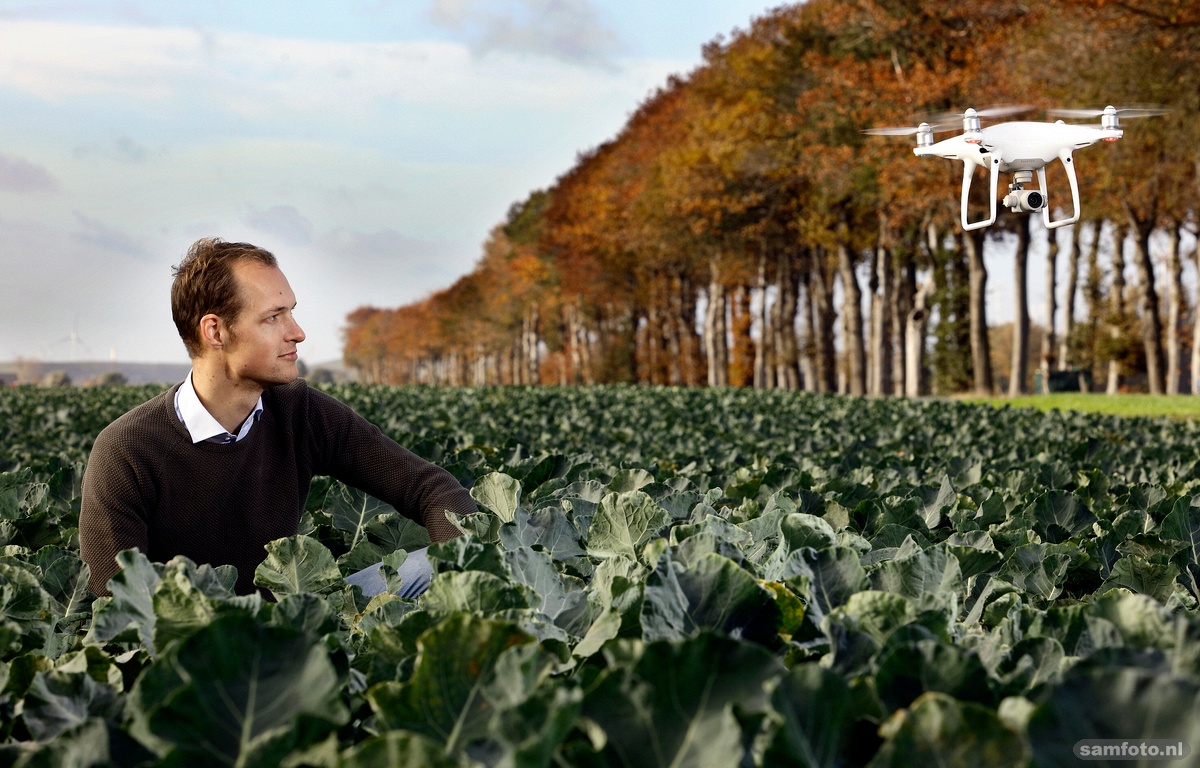Predicting the harvest of vegetables like broccoli using data and drones. This is what TU Delft alumni Kaz Vermeer and Bas Nootebos do. How does their start-up operate?
Kaz Vermeer: “Harvests predictions are based on the grower’s gut feeling.” (Photo: Sam Rentmeester)
“Purchasing organisations only know how much broccoli they’ll be getting when the lorries are unloaded”, says Kaz Vermeer (27). “Harvests predictions are based on the grower’s gut feeling. The actual harvest is almost always different. As a result, purchasing organisations don’t find out if they can serve their customers until a very late stage. Because they can’t build stocks, they have to do last-minute buying or selling, making that head of broccoli more expensive. It’s the biggest uncertainty in the fresh produce value chain. VanBoven is changing all that.”
VanBoven uses accurate predictions of harvests to coordinate demand and supply, making transport more efficient and cheaper. In exchange for this information, customers take out an annual subscription. Vermeer: “In the time it takes a grower to check a dozen plants, we can use a drone to inspect thousands. Crop growth is highly weather-dependent. Currently, a set duration of growth is assumed, but the reality is always different. We process drone footage together with weather data, such as temperature and precipitation, into smart algorithms to predict when it’s possible to harvest. We update this while the crops are growing, allowing us to predict harvest several weeks in advance and providing valuable time for action to be taken in the chain.”
‘We intend to expand our range of fresh produce’
The alumni came up with the idea for their company thanks to Bas Nootebos’ (29) study project on drone use in agricultural soil surveys. Together with Wageningen University alumnus Eric Verhoeff (29), a high school friend, they joined forces. “This has potential, we thought”, explains Vermeer. After that things moved quickly. “Long story short: together with TU Delft’s Faculty of EEMCS, we successfully applied to the NWO for a Take-off Grant. We launched onto the market soon after.”
Like any start-up, VanBoven is still very much in the development stage. At the start of the harvest season, the algorithm was not working optimally. The dataset used to train the models was still too limited. Vermeer: “Some broccoli just looks different. Bigger, smaller, different lighting. Now, at the end of the season, we have a much broader dataset and a more accurate model. We also have to deal with growing seasons, developing in the winter and testing in the summer. That’s more difficult than expected, because you can’t test ideas quickly.”
Vermeer and the team are now broccoli experts. “We’ve proved to four major growers and Bakker Barendrecht, the Albert Heijn purchasing organisation, that our technology works. Next year, we want to scale up to national level for the broccoli product group. We also intend to expand our range of fresh produce to include cauliflower and strawberries.” (EM)
- Company: VanBoven
- Product: Harvest predictions for fresh vegetables
- Founded in: 2018
- Programmes: Mechanical Engineering (Kaz)
- Aerospace Engineering (Bas), Hydrology and Geo-information Science (Eric).
- Number of employees: three founders and six employees
- Target group: fresh produce value chain
- In five years’ time: “VanBoven’s data-driven harvest predictions will be the new standard in the global vegetable market.”
This article was first published in Delft Integraal, TU Delft’s alumni magazine.
Elise Mooijman / Freelance redacteur



Comments are closed.